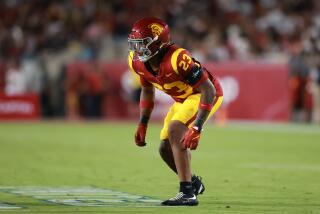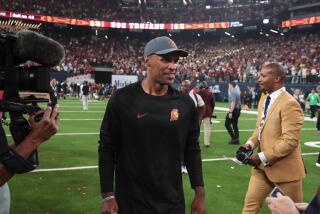In Coauette, Smith Has Somebody Special for His Special Teams
Lots of people figure that football is divided into three equal parts, offense, defense and special teams.
USC Coach Larry Smith disagrees. He says that special teams--the units that play on kickoffs, punts and field goals--are more important than either the offense or defense.
There is also a special team that defends against onside kicks. Smith calls that unit his “hands” team because the players on it are wide receivers, defensive backs, and running backs--usually the good-hands people on a football team.
“Games are won and lost and seasons are turned around by big plays on special tams,” Smith said. “Every time a special team runs onto the field, there is a bigger big-play potential than at at any other time.
“There’s always the exchange of the football involved and usually a critical amount of yardage to make it super critical. And there are more ways to score with special teams than offense and defense put together.”
Smith likes to recall a very special special-teams game.
“When I was at Arizona, we played Iowa at Iowa City in 1980,” he said. “We put five punts inside their five-yard line and we blocked one of them out of the end zone to go up 2-0 on a safety.
“Then, they got a great punt return, kicked a field goal and went ahead, 3-2. It was like a baseball game.
“We got a good kickoff return to start the second half and kicked a field goal. That’s how the game ended, with us winning, 5-3. We also blocked one of their field goals, or they would have won, 6-5.”
Now, 5-3 games won’t sell many season tickets, but Smith made his point on the importance of special teams.
He doesn’t regard his own special teams as anything really special at this juncture of the season.
“Overall, I’m not pleased with our special teams play,” Smith said. “The special teams are not close to where I want them to be, but they will be.”
Smith said that the Trojans need the most improvement in punt blocking and punt returns.
“I figure a team should block five to seven punts a season and return five to seven punts for 20-plus yardage. At Arizona, we averaged five or six blocks a year in the past six years.”
Offensively, USC has a perfect record on field goals through three games. Freshman Quin Rodriguez of Mesa, Ariz., is 5 for 5, and Erik Affholter, the distance specialist, made his only attempt, a 48-yard shot.
Smith is reasonably satisfied with punter Chris Sperle, who hasn’t impressed with his distance kicker but has been getting enough hang time on his punts to prevent long returns and has put the ball inside an opponent’s 10-yard line at times.
Three opponents have been been held to a minus 0.6-yard average on punt returns against USC.
Smith has a specialist in Greg Coauette, who excels in sweeping would-be punt returners off their feet before they can move an inch.
He did that twice against California Saturday as USC won, 31-14, even though he was triple-teamed at the line of scrimmage.
“Even if I miss a guy, the coaches don’t debit me with a missed tackle,” said Coauette, who has nine tackles in three games. “They just say it was good job of getting down there. They just want me to get down there and tear the guy’s head off.”
Coauette, who is on most of the special teams, says it helps if you’re a little bit crazy.
“We don’t have the same enthusiasm on special teams as we did in my first year (1984),” said Coauette, a senior now. “We have good people, but I don’t know if they have the right attitude.
“You’ve got to be crazy when you go down the field, which the coaches are trying to instill. I think you have to turn a switch. I know, for myself, that I start yelling and screaming to get fired up and that gets the guys on the sideline pumped up. You can’t be passive.”
After Coauette has made his frenzied dash down the field on the kickoff or punt team, he then must revert to another mind set, that of a calm, controlled cornerback.
“I like games where you get a TV timeout, so I can catch my wind,” Coauette said. “We didn’t have that against Cal, but I came through all right.”
Said Smith: “Greg is logging a lot of minutes and he seems to be all over the field. And he’s worked hard to turn his weakness--tackling--into a strength. Now he’s one of the best tacklers on the team.”
Coauette, 6 feet 3 inches and 210 pounds, came to USC in 1984 after a year at Glendale College. He grew up, though, as a UCLA fan. He said he admired safety Kenny Easley, now with the Seattle Seahawks, and Kenny Walker, a former UCLA linebacker, lived near him.
“I talked to (Coach) Terry Donahue and he wanted me to go back to Glendale for another football season,” Coauette said. “He said they’d take me after that. ‘If you stay at a junior college, you’d be playing. But once you get to a major college, you have to learn the system, so you might waste a year.’
“I didn’t want to stay two years at Glendale. So I decided to go to USC, where I would waste one year to play two. However, I didn’t think I wasted that first year. I played on special teams, and USC played in the Rose Bowl.”
Coauette was moved to outside linebacker in 1985. He played in the season opener against Illinois but a sprained ankle prevented him from playing the rest of the year and he was red-shirted.
Last year, he returned as a starting cornerback, although his duties were more confined to run containment than they are now.
“Maybe they trust me more now, but I’m more involved in pass coverage than I was before,” he said, laughing. “Last year, I was sort of like a linebacker, squatting on receivers in the flat.”
Coauette said that all of the USC coaches, including Smith, provide input to the special teams. The regulars on offense and defense are on some of the teams, even though it isn’t glamorous duty.
Even a reserve quarterback, red-shirt freshman Shane Foley, lines up in the wedge on the kickoff team. Quarterbacks usually try to avoid getting hit.
“You can make special teams good and sound, so you won’t be beat by them, or you can make them sound and aggressive to beat people with them,” Smith said. “The latter is what I’m striving for. We want to be sound, but also use the teams as a weapon.”
Even if it’s a 5-3 game.
More to Read
Go beyond the scoreboard
Get the latest on L.A.'s teams in the daily Sports Report newsletter.
You may occasionally receive promotional content from the Los Angeles Times.






